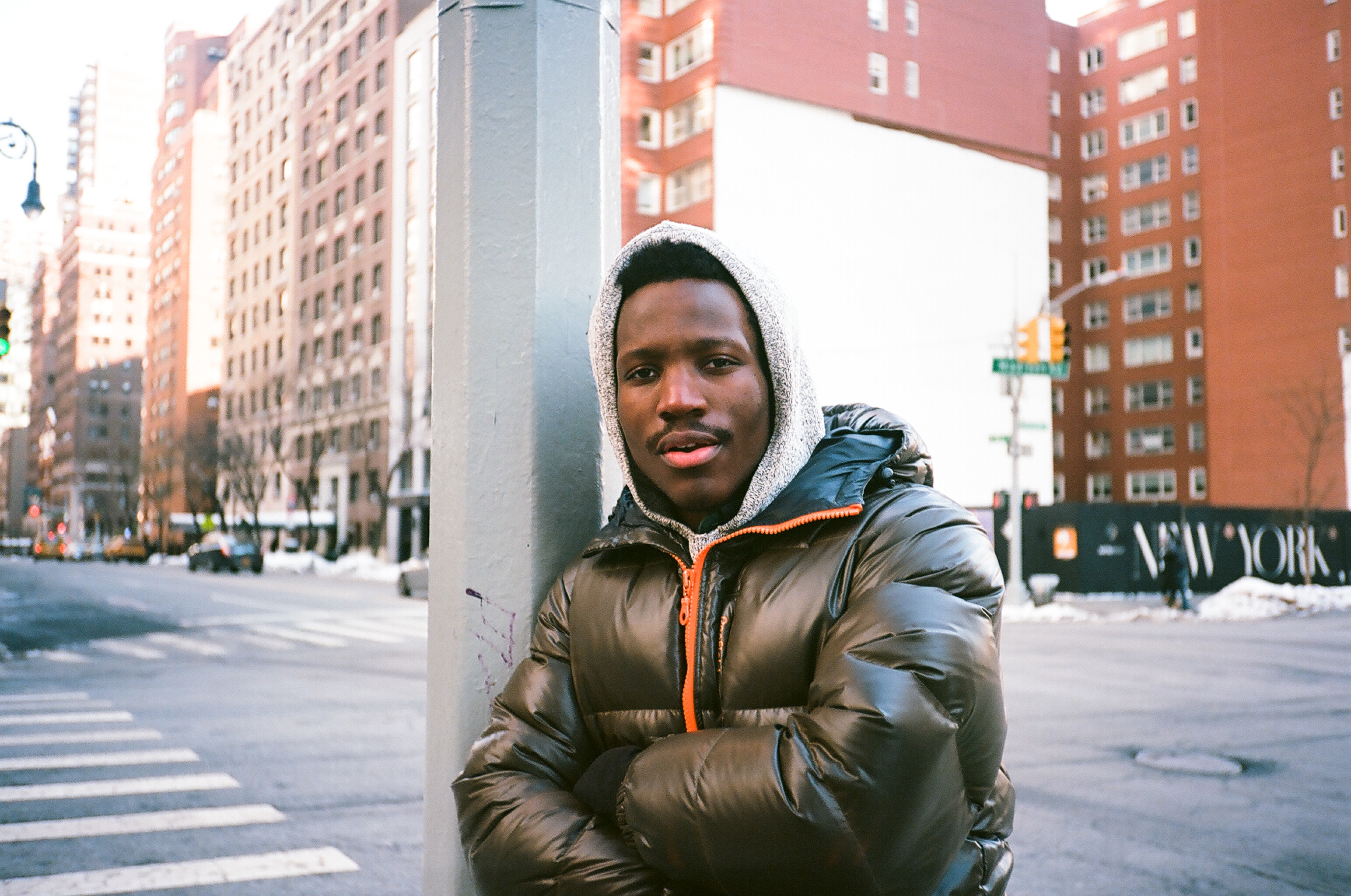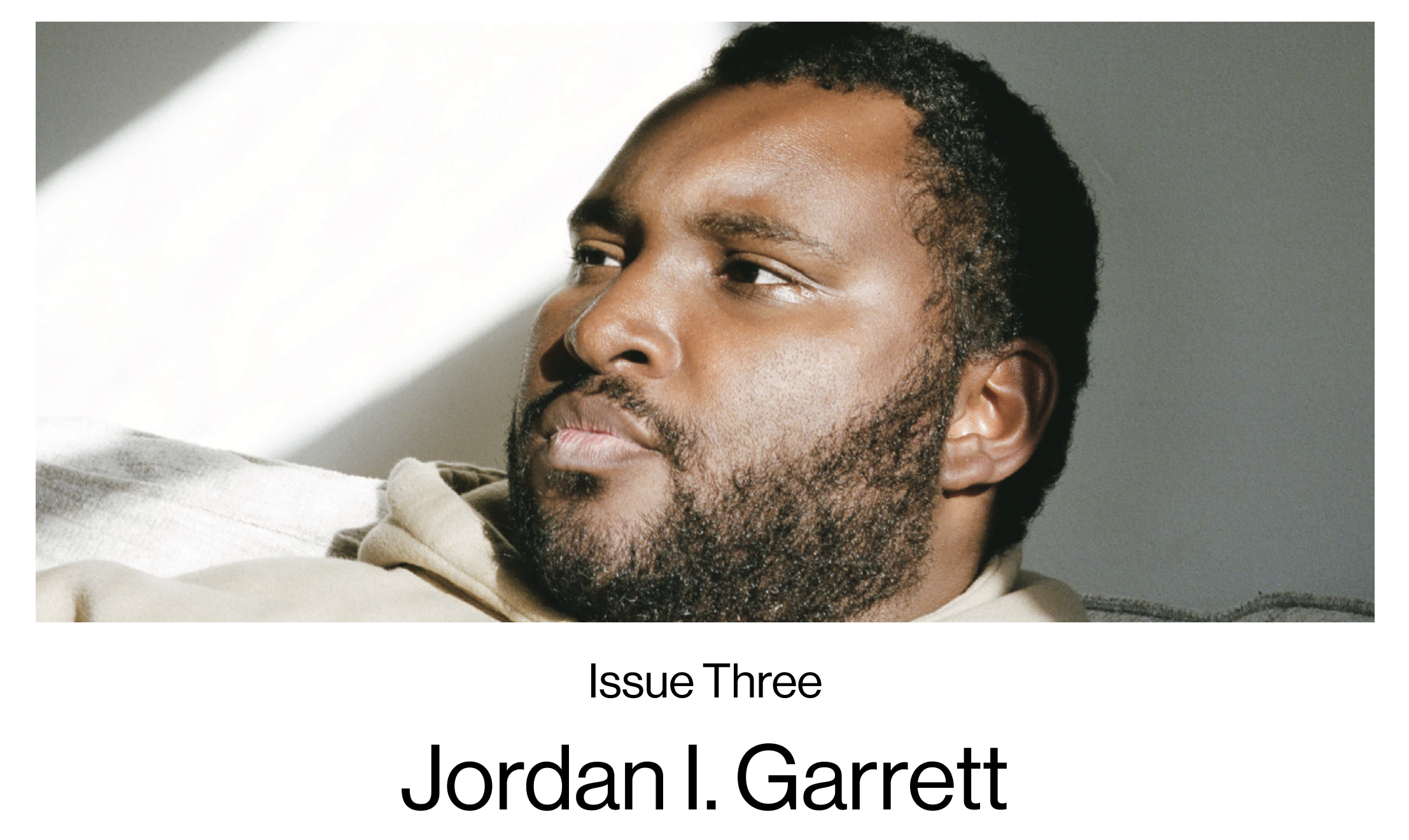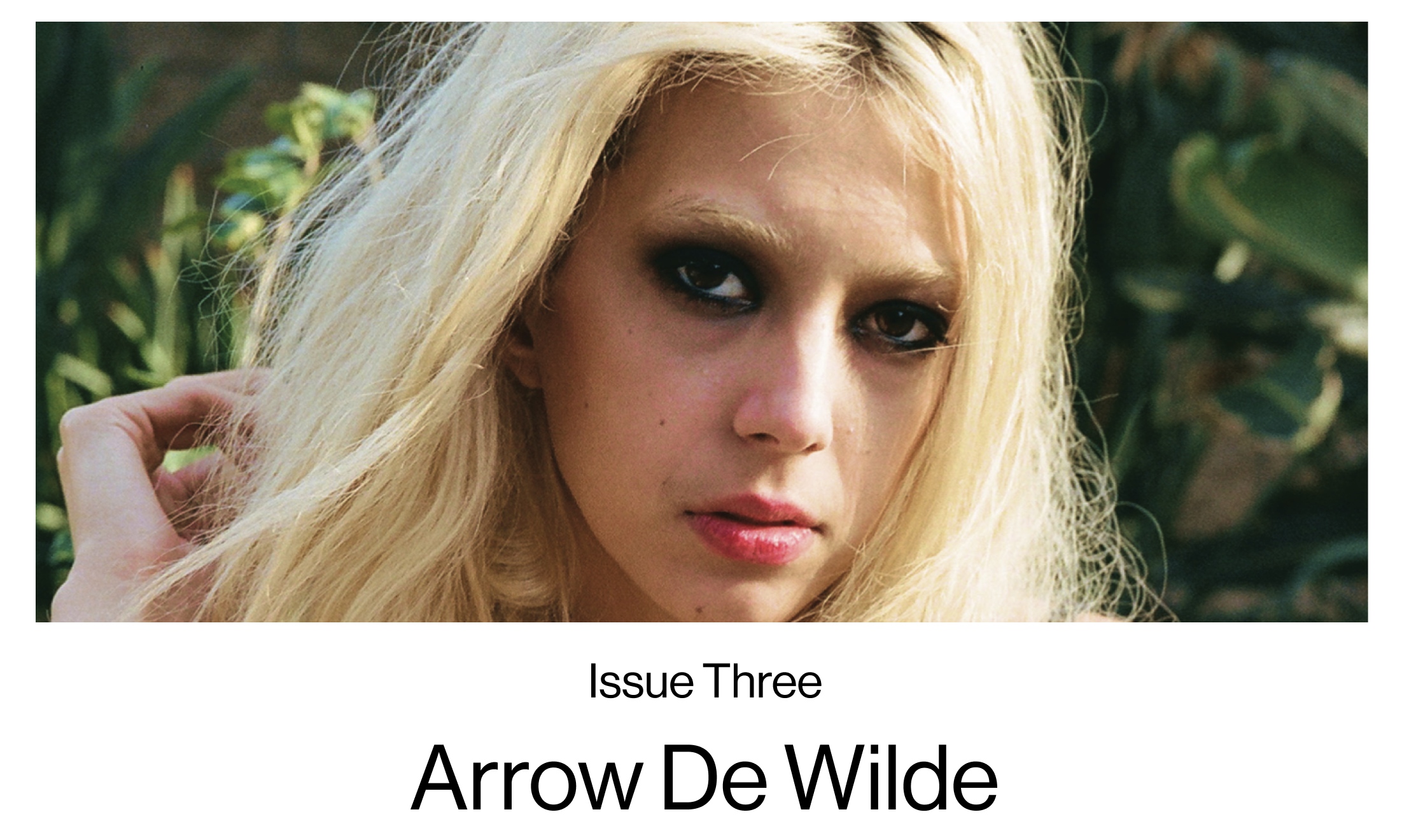

Abel Ngala
The world is often telling us that social media tears us apart and that our world is shrinking because of it. A day with Abel Ngala will expel any such belief. We spent the afternoon walking from Central Park to the East River, eating dollar slices and asking the questions of creation that people have pondered for hundreds of years. We met Abel through his sister and social media, but our meeting was as true a human connection as one could ever have hoped. His vision and desire to create is the same reason we print a magazine: to question those before us and understand our piece in the puzzle. His clothing company “No Cain” was started in his college dorm and he oozes originality with that childlike sense of wonder.
What do you create?
Here’s what I have created so far: I’ve created clothing, websites, posters, marketing campaigns, all with the hopes of soothing people. I started “No Cain” during my fresh- man year of college. It was born out of this deep, deep discomfort, and unsettled feelings about growing up, becoming an adult, and adjusting to the “real world.” I thought about leaving school initially, that’s what it was born out of, and everything I create is a response to growing up, saying maybe adulthood isn’t that bad, maybe with all the responsibilities and accountability that comes with it, there can be beautiful things.
What was it that made you want to create something out of that discomfort instead of dropping out of college? It’s absolutely a way of reacting to it, but it’s an interesting route that not most would choose when going through a hard time.
That was this combination of things that I could never really have controlled—I guess just the way life works out. But it’s funny that you say dropping out because I remember the first week at Trinity, I went to the Student Success office and I was like, “Yo, I actually don’t want to be here,” and they gave me the form to withdraw and everything.
I remember having a conversation with my mom, and we’re an immigrant family... and if you know anything about immigrant families, when you come to America, you come here with dreams. You come here with hopes and aspirations for your kids to have a better life than the one you had back home. So mom’s like, “You know, I know you don’t want to be there. You have to understand your life is your own, but at the same time, there’s so many who sacrificed for you to be here, obviously, do your thing, do what you love, but also understand that in some way, you do have a part to play in this greater lineage, this Nigerian-Cameroon family that you come from.” That was something I understood and was something I could accept.The least I can do for my parents, going through all this shit they went through to come to America, I can get a bachelor’s degree, I can do that for them. And it worked out because now I’m here and making great friends. I get to work on dope projects, without school “Camp Trin” wouldn’t be a thing. My mom and my sister’s adamance about me staying in school and my coming across other cool brands, made me look towards art instead of dropping out or whatever other paths I could have taken.
Here’s what I have created so far: I’ve created clothing, websites, posters, marketing campaigns, all with the hopes of soothing people. I started “No Cain” during my fresh- man year of college. It was born out of this deep, deep discomfort, and unsettled feelings about growing up, becoming an adult, and adjusting to the “real world.” I thought about leaving school initially, that’s what it was born out of, and everything I create is a response to growing up, saying maybe adulthood isn’t that bad, maybe with all the responsibilities and accountability that comes with it, there can be beautiful things.
What was it that made you want to create something out of that discomfort instead of dropping out of college? It’s absolutely a way of reacting to it, but it’s an interesting route that not most would choose when going through a hard time.
That was this combination of things that I could never really have controlled—I guess just the way life works out. But it’s funny that you say dropping out because I remember the first week at Trinity, I went to the Student Success office and I was like, “Yo, I actually don’t want to be here,” and they gave me the form to withdraw and everything.
I remember having a conversation with my mom, and we’re an immigrant family... and if you know anything about immigrant families, when you come to America, you come here with dreams. You come here with hopes and aspirations for your kids to have a better life than the one you had back home. So mom’s like, “You know, I know you don’t want to be there. You have to understand your life is your own, but at the same time, there’s so many who sacrificed for you to be here, obviously, do your thing, do what you love, but also understand that in some way, you do have a part to play in this greater lineage, this Nigerian-Cameroon family that you come from.” That was something I understood and was something I could accept.The least I can do for my parents, going through all this shit they went through to come to America, I can get a bachelor’s degree, I can do that for them. And it worked out because now I’m here and making great friends. I get to work on dope projects, without school “Camp Trin” wouldn’t be a thing. My mom and my sister’s adamance about me staying in school and my coming across other cool brands, made me look towards art instead of dropping out or whatever other paths I could have taken.

It feels as though through your clothing and your website you are trying to create a mentality and space for people to exist. Not just you selling something, but rather creating something that can then maybe spark a conversation over an idea. Is that your goal, to keep engaging and getting people involved?
That’s a great insight because when I think about it now, I really do love the way people engage with me on Insta- gram and in person. Even you reach- ing out, us sitting here and having this conversation, is the result of work we’ve been doing for years. That is a result of work that’s been put in, so as a part of the brand, the way people engage with it, and the way people react to the clothes, that stuff is really inspiring to me. I think that there is a creative and artist in everybody, and if through me—getting my ideas out and making these tee’s—somebody can go, “Hey, I knew that kid, we were in class together,” you know, it’s not that hard, it’s not impossible. That’d be a really cool effect to have.
What is “No Cain”?
There’s always that moment when people put “No Cain” and my name together, so I’m sorry to take that away for a lot of your readers. But my name is Abel: there’s the story of Cain and Abel in the Bible. Pretty much it’s about these two brothers asked by God to come up with offerings. Abel gives his absolute best and Cain doesn’t do the same, so God favors Abel and Cain gets jealous and as a response, Cain kills his brother. He kills Abel and therein lies the crux of the story: God punishes Cain, makes him walk the Earth with this shame. So “No Cain” is literally the inverse of my name but it’s also refuting the evil and jealousy and all these negative things. It’s the literal refutation of those ideas.
It’s interesting to label your company “No Cain.” You’re birthing a new vision, like you’re flipping the story on its head, and in doing so, you’re reclaiming that story for yourself. How do you connect “No Cain” and “Camp Trin”?
Trinity is where I go to college. “Camp Trin” will forever be a part of the brand, just as an ode to college. I think it’s such a beautiful time in so many young people’s lives. I don’t know about you but I’m so different than I was when I was 18 years old. There’s so much growth that happens, and Trinity will always have kids coming through their doors. I’m sure each class will want to wear clothing that represents them and be part of that lineage.
That’s a great insight because when I think about it now, I really do love the way people engage with me on Insta- gram and in person. Even you reach- ing out, us sitting here and having this conversation, is the result of work we’ve been doing for years. That is a result of work that’s been put in, so as a part of the brand, the way people engage with it, and the way people react to the clothes, that stuff is really inspiring to me. I think that there is a creative and artist in everybody, and if through me—getting my ideas out and making these tee’s—somebody can go, “Hey, I knew that kid, we were in class together,” you know, it’s not that hard, it’s not impossible. That’d be a really cool effect to have.
What is “No Cain”?
There’s always that moment when people put “No Cain” and my name together, so I’m sorry to take that away for a lot of your readers. But my name is Abel: there’s the story of Cain and Abel in the Bible. Pretty much it’s about these two brothers asked by God to come up with offerings. Abel gives his absolute best and Cain doesn’t do the same, so God favors Abel and Cain gets jealous and as a response, Cain kills his brother. He kills Abel and therein lies the crux of the story: God punishes Cain, makes him walk the Earth with this shame. So “No Cain” is literally the inverse of my name but it’s also refuting the evil and jealousy and all these negative things. It’s the literal refutation of those ideas.
It’s interesting to label your company “No Cain.” You’re birthing a new vision, like you’re flipping the story on its head, and in doing so, you’re reclaiming that story for yourself. How do you connect “No Cain” and “Camp Trin”?
Trinity is where I go to college. “Camp Trin” will forever be a part of the brand, just as an ode to college. I think it’s such a beautiful time in so many young people’s lives. I don’t know about you but I’m so different than I was when I was 18 years old. There’s so much growth that happens, and Trinity will always have kids coming through their doors. I’m sure each class will want to wear clothing that represents them and be part of that lineage.
READ THE FULL INTERVIEW IN ISSUE THREE






